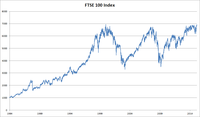FT Index

FTSE 100 Index performance between 1984 and 2015
|
|
| Foundation | 1984 |
|---|---|
| Operator | FTSE Group |
| Constituents | 100 |
| Type | Large cap |
| Market cap | £1.899 trillion (as of Sept 2017) |
| Weighting method | Capitalisation-weighted |
| Related indices | |
| Website | www |
The Financial Times Stock Exchange 100 Index, also called the FTSE 100 Index, FTSE 100, FTSE, or, informally, the "Footsie" /ˈfʊtsi/, is a of the 100 companies listed on the with the highest market capitalisation. It is seen as a gauge of prosperity for businesses regulated by UK company law. The index is maintained by the FTSE Group, a subsidiary of the .
The index is maintained by the FTSE Group, a now wholly owned subsidiary of the which originated as a joint venture between the Financial Times and the London Stock Exchange. It is calculated in real time and published every second when the market is open.
The FTSE 100 broadly consists of the largest 100 qualifying UK companies by full market value. Many of these are internationally focused companies, however, so the index's movements are a fairly weak indicator of how the UK economy is faring - as seen with many of the recent swings corresponding to the value of sterling. A better indication of the UK economy is the FTSE 250, as it contains a smaller proportion of international companies.
FTSE 100 companies represent about 81% of the entire market capitalisation of the London Stock Exchange. Even though the FTSE All-Share Index is more comprehensive, the FTSE 100 is by far the most widely used UK stock market indicator. Other related indices are the FTSE 250 Index (which includes the next largest 250 companies after the FTSE 100), the FTSE 350 Index (which is the aggregation of the FTSE 100 and 250), FTSE SmallCap Index and the FTSE Fledgling Index. The FTSE All-Share aggregates the FTSE 100, FTSE 250 and FTSE SmallCap.
...
Wikipedia
